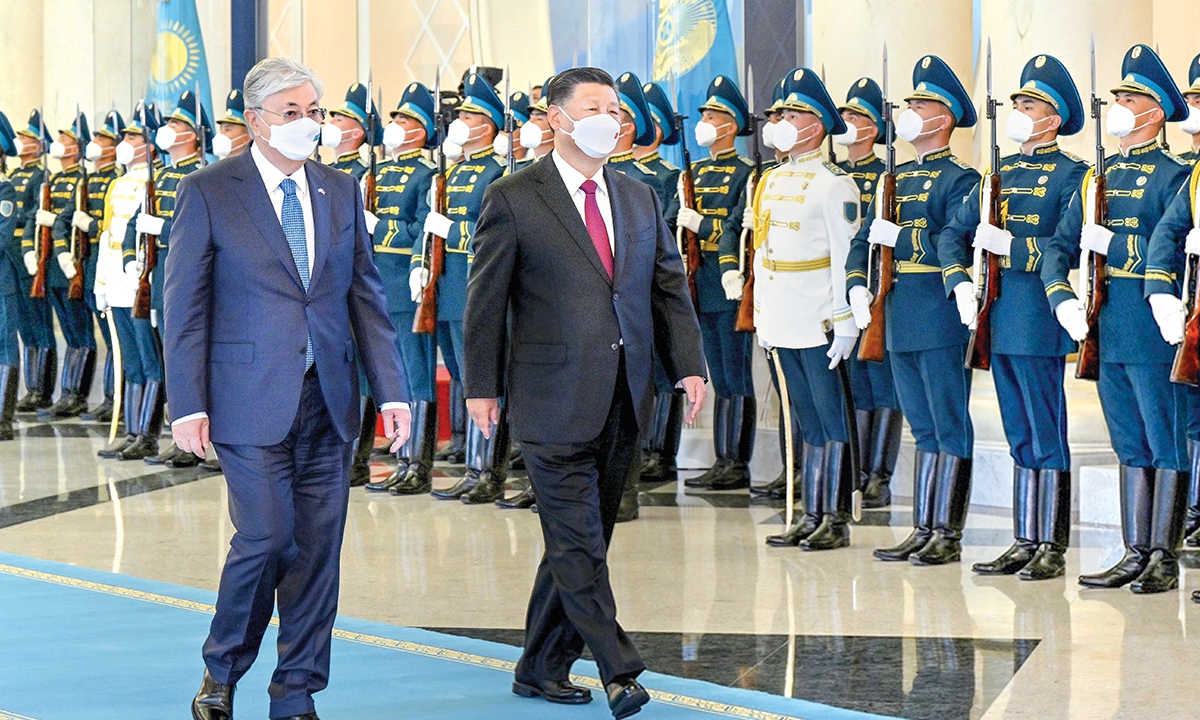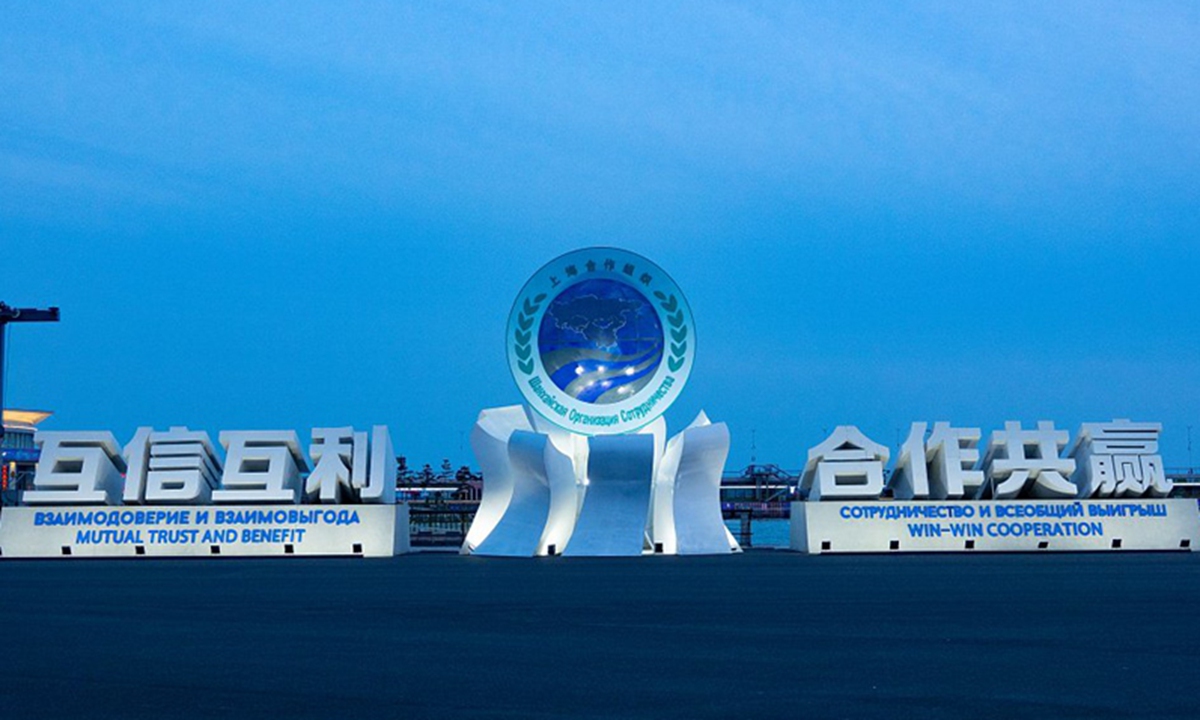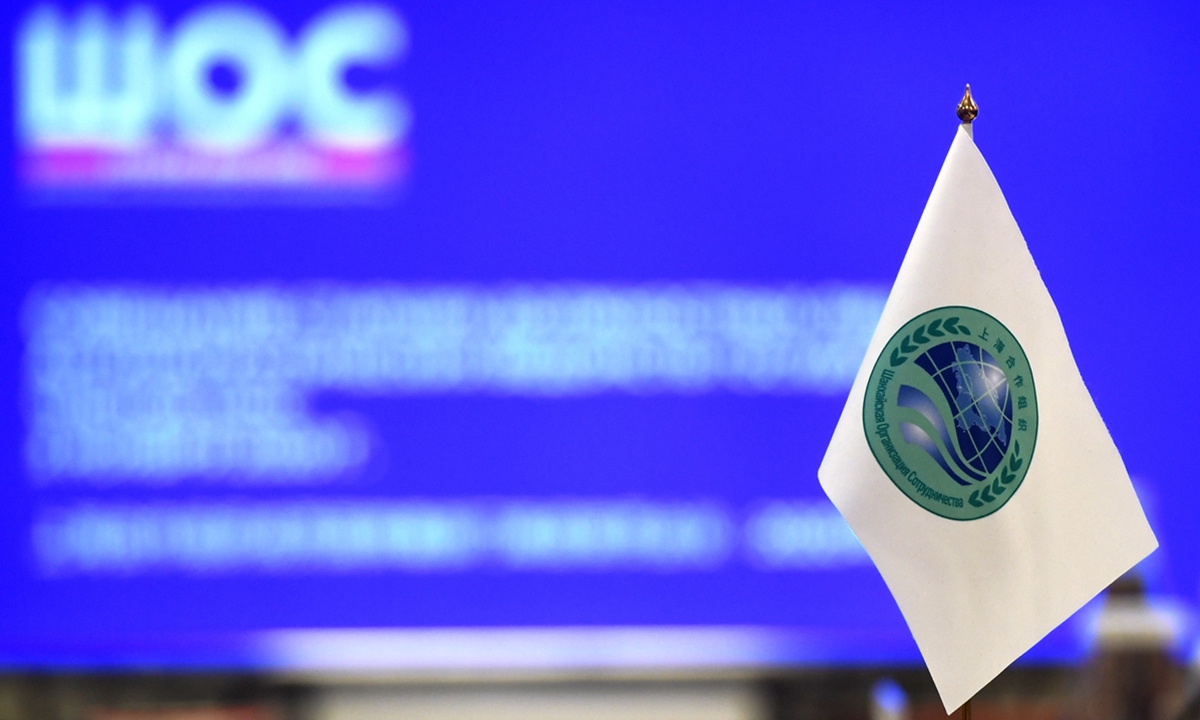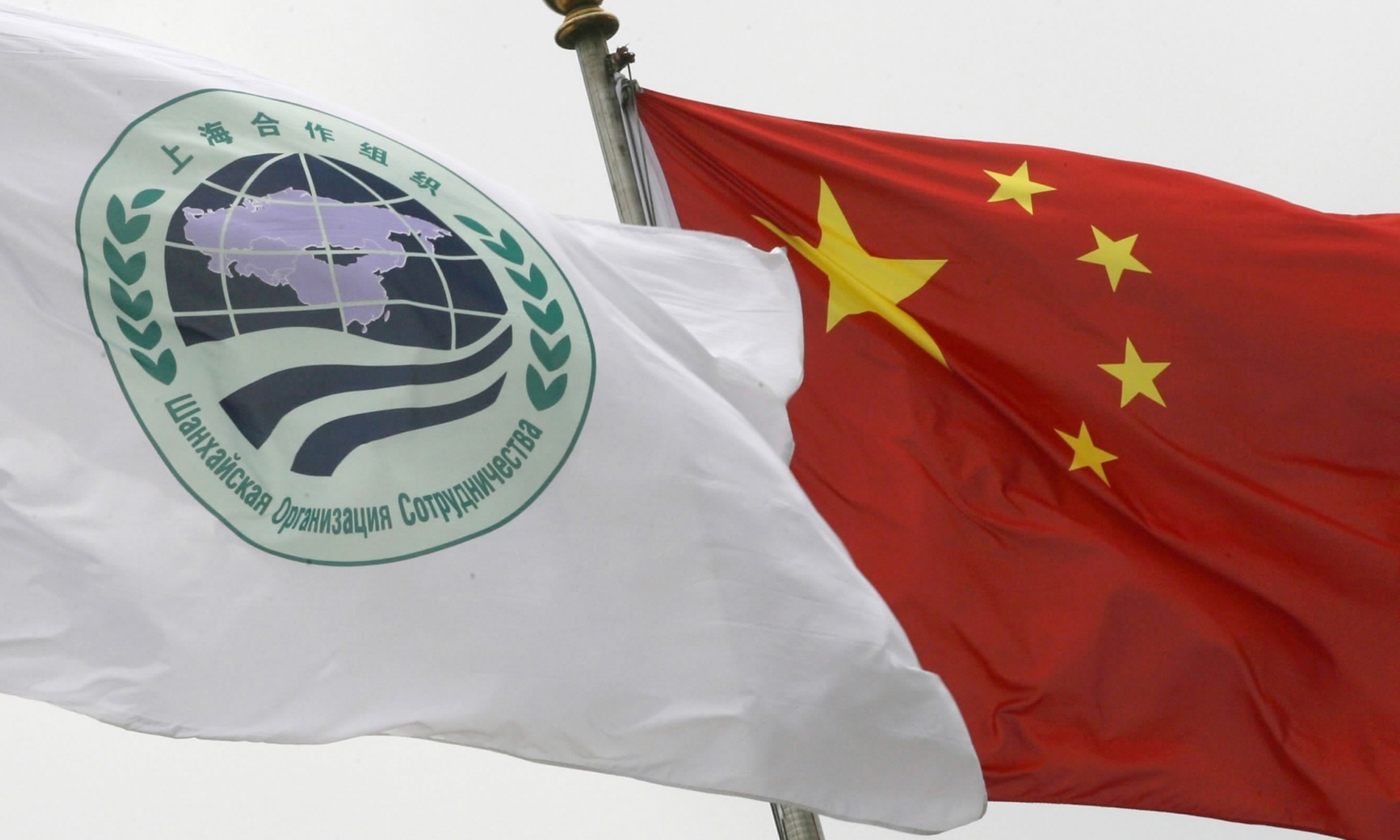A signboard of the SCO Samarkand Summit is seen in Samarkand, Uzbekistan. Photo: Courtesy of Embassy of Uzbekistan in China
Editor's Note:
The 22nd Meeting of the Council of Heads of State of the Shanghai Cooperation Organisation (SCO) will take place in the historical city of Samarkand, Uzbekistan on September 15-16. How the SCO member states will work together to address the most pressing global and regional challenges is receiving worldwide attention. In the countdown to the SCO Samarkand Summit, President of the Republic of Uzbekistan Shavkat Mirziyoyev contributed a signed article to the Global Times on his expectations that the SCO, as one of the youngest international organizations that has realized a model for successful regional cooperation, will make a new contribution to solving the acute political and economic problems facing the contemporary international community.
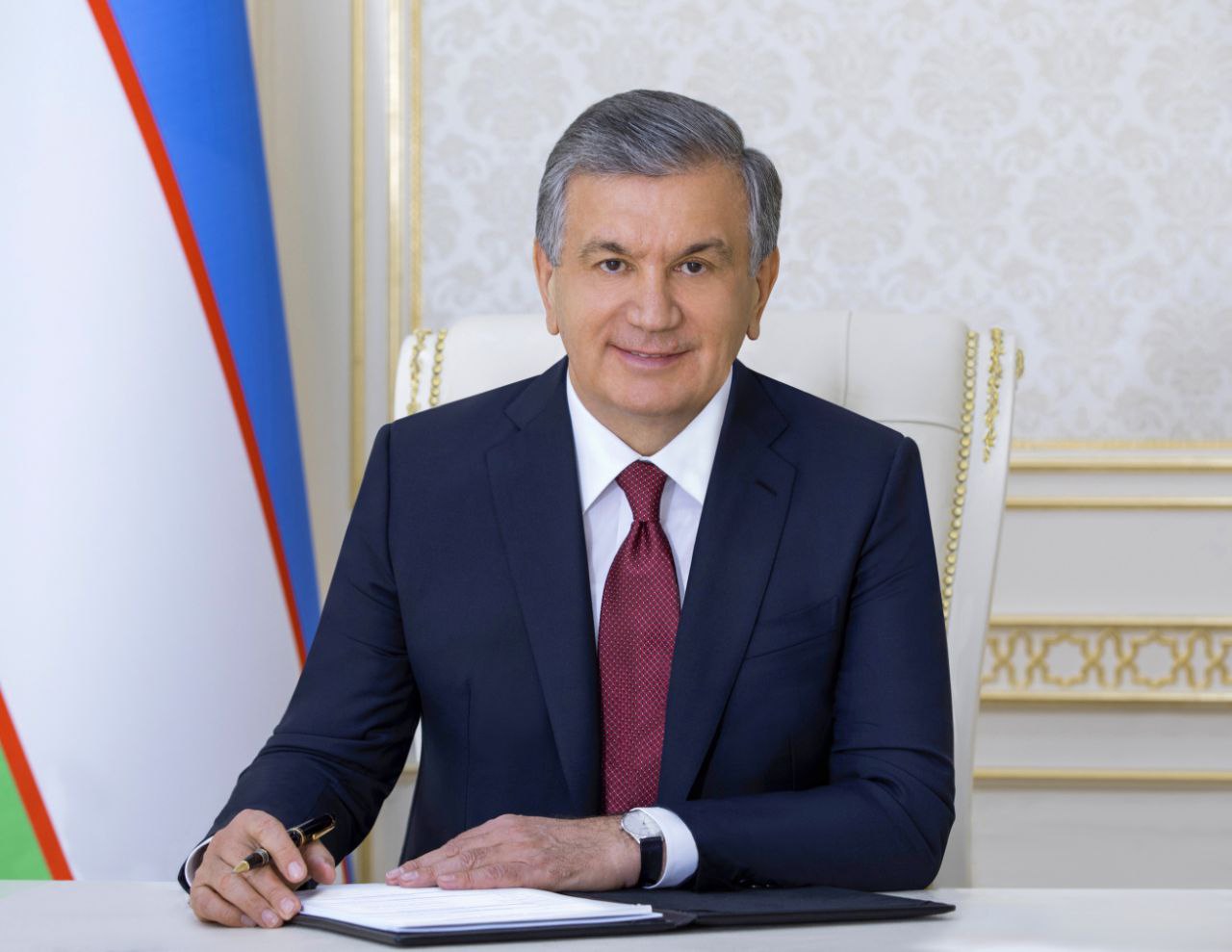 President of the Republic of Uzbekistan Shavkat Mirziyoyev. Photo: Courtesy of Embassy of Uzbekistan in China
President of the Republic of Uzbekistan Shavkat Mirziyoyev. Photo: Courtesy of Embassy of Uzbekistan in China
Uzbekistan's chairmanship in the Shanghai Cooperation Organisation (SCO) has entered a dynamic period, fraught with various events and trends - the period of the "historical rift," when one era comes to an end and another begins - thus far unpredictable and unknown.
The modern system of international cooperation, based on the universal principles and norms, has begun to falter. One of the main reasons for this is a deep crisis of trust at the global level, which, in turn, has provoked a geopolitical confrontation and the risk of reviving bloc thinking stereotypes. This process of mutual alienation complicates the return of the world economy to its former course of development and the restoration of global supply chains.
The ongoing armed conflicts in different parts of the world have destabilized trade and investment flows, exacerbating problems of ensuring food and energy security.
Along with this, global climate shocks, growing scarcity of natural resources including water, a decline in biodiversity, and the spread of dangerous infectious diseases have exposed the vulnerability of our societies as never before. They lead to destruction of existential common goods, threatening the basis of people's lives and reducing sources of income.
Under these circumstances, it is obvious that no country alone can hope to avoid or cope with these global risks and challenges.
There is only one way out of the dangerous spiral of problems in an interconnected world where we all live today - through a constructive dialogue and multilateral cooperation based on consideration and respect for everyone's interests. It is exactly at the time of crisis when all the countries - whether they be large, medium, or small - must put aside their narrow interests and focus on mutual interaction, unite, and increase the common efforts and possibilities to counter threats and challenges to peace, security, and sustainable development that are related to each of us.
Effective international cooperation makes the world more stable, predictable, and prosperous. This is the most viable, accessible, and the closest way to solve common problems of the time as well as a universal insurance policy against future challenges and shocks.
A model for successful regional cooperation
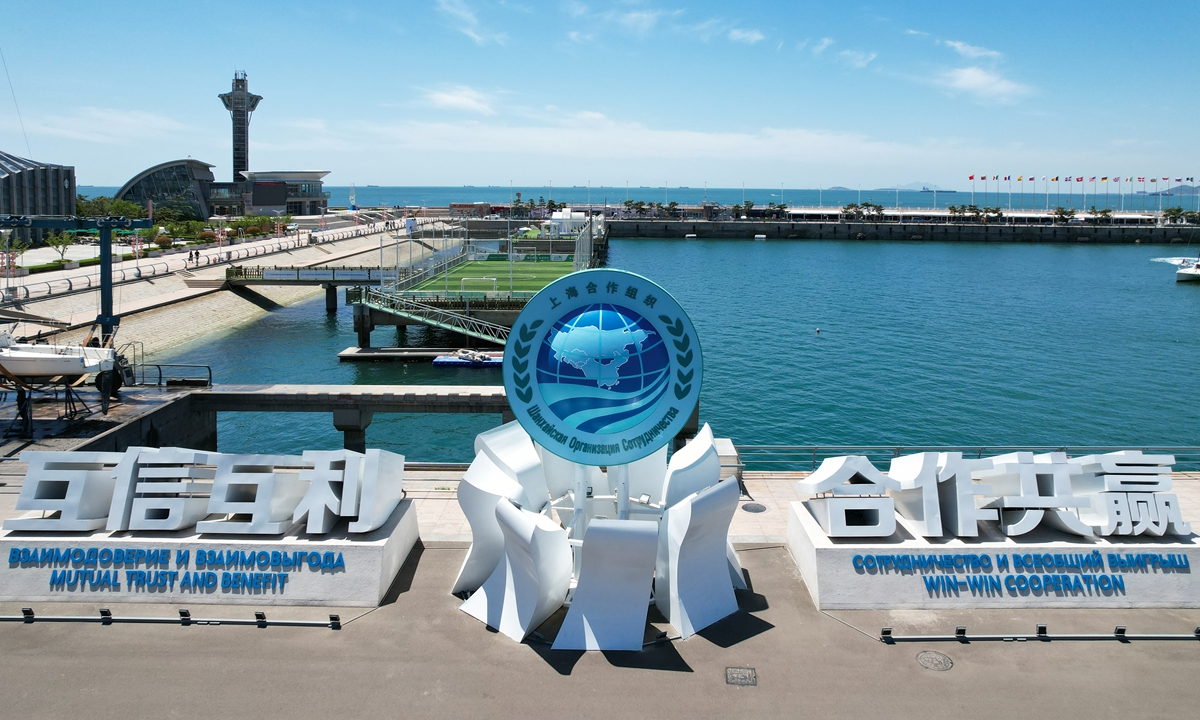
A sculpture featuring the logo of the SCO is seen in Qingdao, East China's Shandong Province. Photo: VCG
The international cooperation that is in the interest of everyone is impossible without multilateral institutions. Despite certain shortcomings, they continue to serve as the most important agents of interaction between countries - at the regional and global levels. International and regional organizations help countries to overcome differences and strengthen mutual understanding, develop political and economic cooperation, expand trade, and stimulate cultural and humanitarian exchanges.
These are the goals and objectives that are being pursued by one of the youngest multilateral institutions - the Shanghai Cooperation Organisation. In fact, it is a unique interstate structure that has managed to unite countries with different cultural and civilizational codes, their own foreign policy guidelines, and models of national development. In a relatively short historical period, the SCO has come a long way, becoming an integral element of the modern global political and economic world order.
Today, the SCO family is the world's largest regional organization, which has united a huge geographical space and about a half of the population of our planet.
The basis for SCO's international attractiveness is its non-bloc status, openness, not negatively targeting third countries or other international organizations, equality and respect for the sovereignty of all participants, refusal to interfere in internal affairs, as well as prevention of political confrontation and unhealthy rivalry.
The SCO's success concept is the promotion of multifaceted cooperation through ensuring regional security.
In fact, the Shanghai Cooperation Organisation has been called upon to become a pole of attraction without dividing lines, in the name of peace, cooperation, and progress.
Therefore, the number of states that are ready to cooperate with the SCO is growing every year, and this is especially noticeable in the context of the transformation of the modern system of international and regional relations.
The economic value of the SCO is enhanced by the self-sufficiency of its space, where there are dynamically developing economies in the world with huge human, intellectual, and technological potential, and the existence of large volumes of unused natural resources.
Today, the total GDP of the SCO member states has reached about a quarter of the global figure. This is already a very solid contribution to global sustainable development from a regional organization that has just crossed its 20-year threshold.
In a world with new challenges and opportunities, the SCO has excellent prospects for transformation and growth, not only through quantitative replenishment, but also through the opening of new strategic vectors. These are transport and connectivity, energy, food and environmental security, innovations, digital transformation, and green economy.
Uzbekistan's chairmanship: towards common success through joint development
Accepting the responsible mission of the Chairmanship of the SCO, the Republic of Uzbekistan has relied on the strategy of advancing the development of the Organization by opening up new horizons for cooperation and launching usage of untapped reserves that each of its members has.
Our slogan is "The SCO is strong if each of us is strong." Implementing this, we have made serious efforts to make the Organization even stronger from the inside and more attractive from the outside to our international partners.
At the platforms of more than 80 major events held during the year, a comprehensive agenda was formed for the SCO - starting from the issues of further expanding cooperation in security, strengthening transport and economic connectivity, and positioning the Organization in the international arena, up to the search for new ways and points for development.
All these promising directions of cooperation for the SCO at this new stage of its historical development are reflected in more than 30 conceptual programs, agreements, and decisions prepared during our leadership tenure.
What's more, Uzbekistan's chairmanship in the SCO is a logical continuation of an active and open foreign policy course that has been pursued by our country in the last six years. This policy is embodied, above all, in Central Asia, the geographical core of the SCO, where positive and irreversible processes of strengthening good-neighborliness and cooperation are now taking place.
All SCO member states are our closest neighbors, friends, and strategic partners.
The chairmanship has given us a good opportunity to further strengthen multilateral collaboration and expand bilateral cooperation with each of them, as well as setting new targets for even deeper partnership.
I am full of confidence that it is important and necessary for the SCO to share its success story with Afghanistan. This country is an integral part of the larger SCO space. The Afghan people need good neighbors and their support now more than ever. It is our moral obligation to extend a helping hand, to offer them effective ways of overcoming the years-long crisis by promoting socioeconomic growth in the country and its integration into regional and global development processes.
Afghanistan has, for centuries, played the role of a buffer in the historical confrontations of global and regional powers, and should try a new peaceful mission of connecting Central and South Asia.
The construction of the trans-Afghan corridor could become a symbol of such mutually beneficial inter-regional cooperation. It is also important to understand that by implementing joint infrastructure projects such as the Termez - Mazar-i-Sharif - Kabul - Peshawar railroad, we are not just solving socioeconomic, transportion, and communication problems, but also making a significant contribution to ensuring regional security.
By bringing our positions closer to each other, together we can develop a new SCO agenda for a more peaceful, stable, and prosperous Afghanistan. Only in this way can we create a truly stable and sustainable SCO space with indivisible security.
'Samarkand Spirit' - the embodiment of cooperation, mutual understanding and friendship
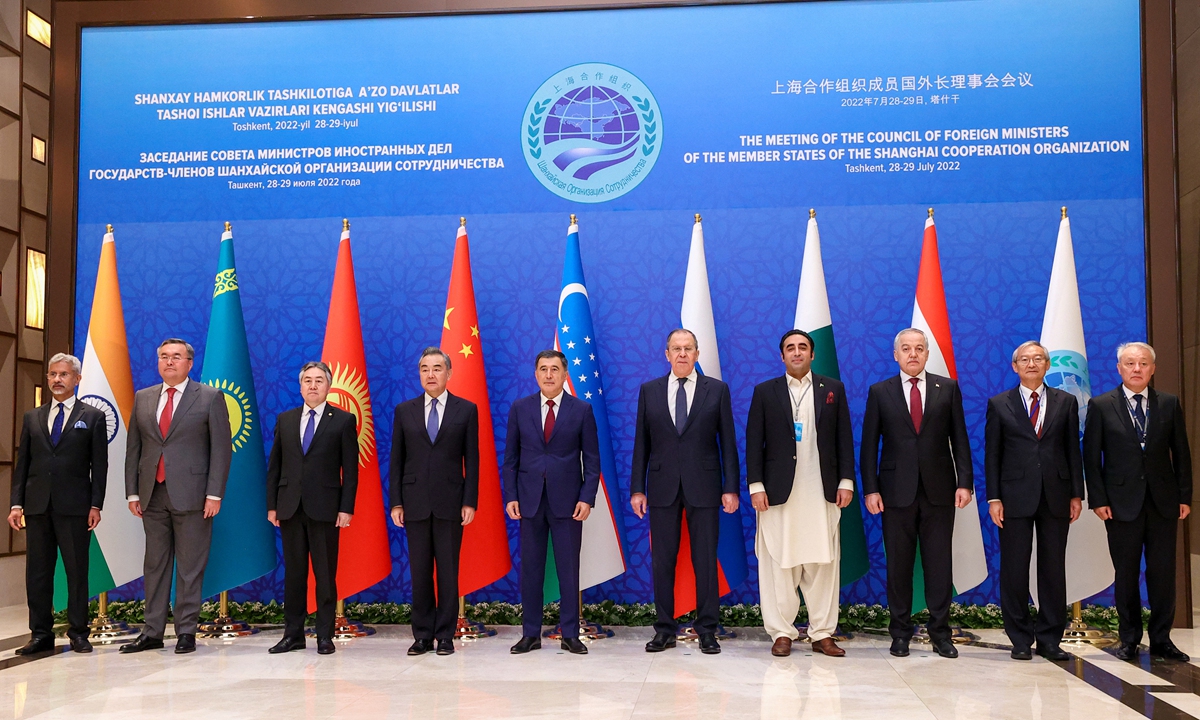
Foreign ministers of the SCO member states hold a meeting in Tashkent on July 29, 2022. Photo: AFP
After a three-year pandemic pause that has caused serious disruption in trade, economic and industrial ties, the countries and peoples of the SCO need to communicate directly.
The ancient city of Samarkand, the jewel of the Great Silk Road, is ready to welcome the leaders of 14 countries with new breakthrough proposals and initiatives designed to serve for the good and prosperity of the SCO and each of its members.
There is no doubt that this legendary city will open another chapter of the SCO success story. The glorious historical heritage of Samarkand will contribute to this.
For many centuries, this city has been threading together countries from Europe to China, merging North and South, and East and West into a single node.
Historically Samarkand has been a melting pot of ideas and knowledge, that was "cooking" a common goal of living better, being more successful, and becoming happier. And everybody has known that the friendly neighbors are half of your wealth, you yourself are a blessing for them, because you know that cooperation, trade, oeuvre, science, art, and the best ideas do good, enrich, and bring nations together.
These unique qualities of Samarkand, which today has a modern and dynamically developing infrastructure, turning it into the most suitable and demanded platform for joint discussions, searching for necessary responses to regional and global challenges.
The integrity and interconnectivity of mankind are such that most challenges require joint work not only at the regional level, but also on the global arena.
Relying on the experience of our many years of joint work, we are confident that the Samarkand SCO summit will set an example of how we can launch a new, inclusive dialogue based on the principles of mutual respect, trust, and constructive cooperation for the sake of common security and prosperity.
Samarkand can become the platform that can unite and reconcile states with different foreign policy priorities.
Historically, the world looked upon from Samarkand has been seen as single and indivisible, rather than fragmented. This is indeed the essence of the unique phenomenon of the "Samarkand spirit," which can serve as the basis for a fundamentally new format of international interaction, including within the Shanghai Cooperation Organisation.
The "Samarkand spirit" is designed to naturally complement the very "Shanghai spirit," thanks to which more than 20 years ago our countries decided to create a new and eagerly sought after organization.
Therefore, we are confident that in Samarkand we shall witness the birth of a new stage in the life of the SCO - the number of its members will grow, and its future agenda will be formed, and this is highly symbolic.
We are full of optimism and are convinced that the decisions of the upcoming summit of Shanghai Cooperation Organisation will make a feasible contribution to strengthening the dialogue, mutual understanding, and cooperation both at the regional level and on a global scale.
By Shavkat Mirziyoyev
https://www.thestar.com.my/aseanplus/aseanplus-news/2022/09/16/when-global-power-shifts

Xi kicks off 1st foreign trip since pandemic, ushers in new 'golden'
...
Chinese President Xi Jinping arrived at Nur-sultan Wednesday for a state visit to Kazakhstan, the first foreign visit of the .
Source link
RELATED ARTICLES
The Russia-Ukraine conflict and the US’ attempt to split the world and demolish the world order through promoting ...
China Development Bank and banks of the member countries of the Shanghai Cooperation Organization (SCO) signed a regional ...
Chinese President Xi Jinping will attend the 22nd meeting of the Council of Heads of State of the ...
Related posts:
Under banner of 'counter-terrorism,' US
exports instability and plunders foreign resources for 21 years
...




 President of the Republic of Uzbekistan Shavkat Mirziyoyev. Photo: Courtesy of Embassy of Uzbekistan in China
President of the Republic of Uzbekistan Shavkat Mirziyoyev. Photo: Courtesy of Embassy of Uzbekistan in China

 Foreign ministers of the SCO member states hold a meeting in Tashkent on July 29, 2022. Photo: AFP
Foreign ministers of the SCO member states hold a meeting in Tashkent on July 29, 2022. Photo: AFP

